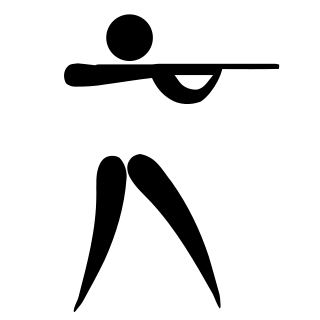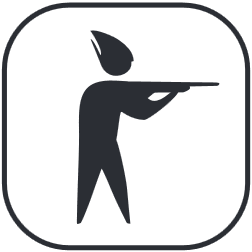
The men's ISSF 25 meter rapid fire pistol competition at the 2004 Summer Olympics was held on 21 August at the Markopoulo Olympic Shooting Centre near Athens, Greece. This was the last Olympic competition before the major rule changes that took place on 1 January 2005, and which lowered the results of the event. There were 17 competitors from 14 nations.

The men's ISSF 50 meter pistol competition at the 2004 Summer Olympics was held on 17 August at the Markópoulo Olympic Shooting Centre near Athens, Greece. There were 42 competitors from 31 nations.

The men's ISSF 25 meter rapid fire pistol event at the 2008 Olympic Games took place on August 15 and 16 at the Beijing Shooting Range Hall. There were 19 competitors from 14 nations. The event was won by Oleksandr Petriv of Ukraine, the nation's first medal in the event. Germany took silver and bronze. It was Schumann's fifth and final Olympic medal in the event; with three golds and two silvers, he was individually more successful than any nation other than Germany. After rule changes, new Olympic records were established by Keith Sanderson and Petriv (final).

The men's ISSF 50 meter pistol event at the 2008 Olympic Games took place on August 12 at the Beijing Shooting Range Hall. There were 45 competitors from 32 nations. The event was won by Jin Jong-oh of South Korea, the first of his three consecutive victories in the free pistol. It was his second medal, after taking silver in 2004; he was the 10th man to win multiple medals in the event.

The men's trap event at the 2008 Summer Olympics took place on August 9 and 10 at the Beijing Shooting Range Clay Target Field. There were 35 competitors from 25 nations, with each nation having up to two shooters. The Czech Republic won its second shooting gold in two days through David Kostelecký, shooting a perfect 25 in the final round and establishing an Olympic record of 146 hits total after a 2005 rule change. It was the Czech Republic's first medal in the men's trap. Giovanni Pellielo of Italy repeated as the silver medalist; in addition to his 2000 bronze, this made Pellielo the first man to earn at least three medals in the event; he would go on to win a fourth in 2016. Defending Olympic champion Aleksei Alipov of Russia took bronze this year, making him the fifth man to earn two medals in the trap.

The men's ISSF 50 meter pistol competition at the 2000 Summer Olympics was held on 19 September. There were 36 competitors from 27 nations. Nations had been limited to two shooters each since the 1952 Games. Tanyu Kiryakov won, becoming the first shooter to win Olympic gold medals in both this event and 10 metre air pistol. 2.7 points behind, Igor Basinski won his fourth Olympic medal. Kiryakov's gold was Bulgaria's first free pistol victory, and the first medal of any color in the event for the nation since 1980. Martin Tenk's bronze was the Czech Republic's first medal in the event.

The men's ISSF 50 meter pistol was one of the fifteen shooting events at the 1996 Summer Olympics, held on 23 July at the Wolf Creek Shooting Complex in Atlanta. There were 45 competitors from 28 nations. It was the first time decimals were used in the 50 metre pistol finals. Boris Kokorev set a new Olympic record after scoring 570 points in the qualification round and 96.4 in the final, winning the gold medal, while places 2 through 5 were occupied by Belarusian and Italian shooters. Russia, Belarus, and Italy all received their first medal in the free pistol. Silver medalist Igor Basinski was the ninth man to win multiple medals in the event.

The men's ISSF 50 meter pistol was one of the thirteen shooting events at the 1992 Summer Olympics. There were 44 competitors from 29 nations. Nations had been limited to two shooters each since the 1952 Games. The competition was held on 26 July 1992 at the Mollet del Vallès shooting range.

The men's ISSF 50 meter pistol was one of the thirteen shooting events at the 1988 Summer Olympics. It was the second Olympic free pistol competition to feature final shooting, after an abortive attempt in 1960. There were 43 competitors from 31 nations. Nations had been limited to two shooters each since the 1952 Games. The event was won by Sorin Babii of Romania, the nation's first victory in the event and first medal in free pistol since 1972. Ragnar Skanåker of Sweden repeated as silver medalist, the second man to earn three medals in the free pistol; four years later, he would become the first to win four medals. Soviet Igor Basinski took bronze.

Shooting at the 2010 Summer Youth Olympics, as approved by the International Shooting Sport Federation, comprised 10 metre air rifle and 10 metre air pistol, each for boys and girls, with 80 competitors altogether. For each of the four events, a total of twenty NOCs qualified and participated with one competitor each.

The men's ISSF 25 meter rapid fire pistol event at the 2012 Olympic Games was held on 2 and 3 August 2012 at the Royal Artillery Barracks. There were 18 competitors from 13 nations. The event was won by Leuris Pupo of Cuba. Silver went to Vijay Kumar of India, while Ding Feng of China took bronze. It was the first medal in the event for all three nations. Ralf Schumann missed the final for the first time; he had reached the final in the previous six Games.

The men's trap event at the 2012 Olympic Games took place on 5 and 6 August 2012 at the Royal Artillery Barracks. There were 34 competitors from 27 nations. The event was won by Giovanni Cernogoraz of Croatia, the nation's first medal in the men's trap. Massimo Fabbrizi of Italy took silver, the third consecutive silver and fourth Games on the podium for Italy. Kuwait, like Croatia, earned its first medal in the men's trap; Fehaid Al-Deehani took bronze.

Shooting at the 2014 Summer Youth Olympics was held from 17 to 22 August at the Fangshan Sports Training Base in Nanjing, China.
This article details the qualifying phase for shooting at the 2016 Summer Olympics. 366 quota places for the Games are entitled to the shooters coming from their respective NOCs, based on the results at designated ISSF supervised Championships subjected to the ISSF rules from August 1, 2014, to March 31, 2016, while the remaining twenty-four are available to the eligible NOCs under the Tripartite Commission Invitation to get a total quota of 390. Host nation Brazil has been guaranteed nine quota places with one in each of the following events: 50 m rifle prone, 25 m rapid fire pistol, 10 m air pistol, 10 m air rifle (women), trap, and skeet.

The men's ISSF 50 meter pistol event at the 2016 Olympic Games took place on 10 August 2016 at the National Shooting Center. There were 41 competitors from 29 nations. The event was won by Jin Jong-oh of South Korea, his third consecutive victory in the free pistol. He was the only man to win two gold medals in the event, much less three. Jin was also the second man to win four medals of any color in the event, after Ragnar Skanåker of Sweden from 1972 to 1992. Hoàng Xuân Vinh took silver, the first medal for Vietnam in the event. Kim Song-guk's bronze was North Korea's first medal in the free pistol since 2004.

The men's ISSF 25 meter rapid fire pistol event at the 2016 Olympic Games took place on 12 and 13 August 2016 at the National Shooting Center. There were 26 competitors from 20 nations. The event was won by Christian Reitz of Germany, the nation's first victory in the event and fifth overall. Reitz, the bronze medalist in 2008, was the 12th man to win multiple medals in the rapid fire pistol. Jean Quiquampoix of France took silver, the nation's first medal in the event since 1900. China took bronze, just as in 2012, this time by Li Yuehong.

The men's trap at the 2016 Summer Olympics took place on 7–8 August 2016 at the National Shooting Center. There were 33 competitors from 24 nations.
This article details the qualifying phase for shooting at the 2020 Summer Olympics. 300 quota places for the Games are entitled to the shooters coming from their respective NOCs, based on the results at designated ISSF supervised Championships subjected to the ISSF rules from September 1, 2018, to June 6, 2021. Host nation Japan has been guaranteed twelve quota places with one in each of the individual events. Four quota places will be awarded to the shooters competing in each of the mixed team events, while the highest-ranked shooter, who has not qualified yet or whose NOC does not have a berth in any of the twelve individual events, will obtain a direct Olympic quota place through the World Rankings. The remaining twenty-four quota places are available to the eligible NOCs under the Tripartite Commission Invitation, with two in each of the individual event, to attain a maximum number of 360.

The men's ISSF 25 meter rapid fire pistol event at the 2020 Summer Olympics took place on 1 and 2 August 2021 at the Asaka Shooting Range. Approximately 30 shooters from 20 nations are expected to compete in the rapid fire pistol, with the precise number depending on how many shooters compete in multiple events.

The men's ISSF Olympic trap event at the 2020 Summer Olympics took place on 28 and 29 July 2021 at the Asaka Shooting Range. Approximately 30 sport shooters from 20 nations are expected to compete in the trap, with the precise number depending on how many shooters compete in multiple events.














